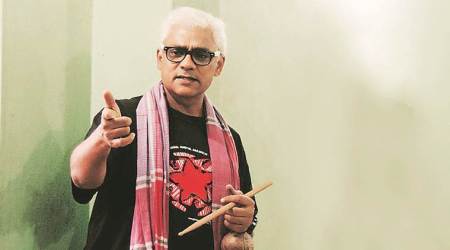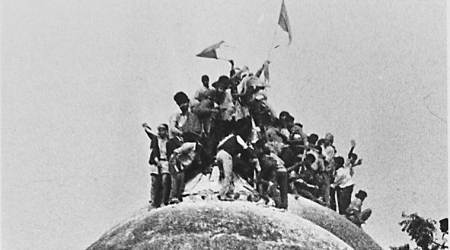 “As far as the question of finding a solution to the Ayodhya dispute is concerned, board has never shied away from any talks, but any dialogue should be between main parties with active involvement of central government,” said Farooqui’s statement. (File)
“As far as the question of finding a solution to the Ayodhya dispute is concerned, board has never shied away from any talks, but any dialogue should be between main parties with active involvement of central government,” said Farooqui’s statement. (File)
After the Shia Central Waqf Board filed an affidavit in Supreme Court on Tuesday claiming that the Babri Masjid was Shia Waqf property, a member of the Central Waqf Council, who is in-charge of Uttar Pradesh and Jharkhand, in a letter to the board accused it of “deliberately jumping into the Ayodhya cause” to “dilute” ongoing proceedings for a CBI probe in the case pertaining to it.
The Sunni Central Waqf Board too issued a statement on Thursday, responding strongly to the claim. Calling it “baseless”, it asked the Shia Waqf Board to clarify its allegation by explaining who it was referring to as “kattarpanthi, unmadi” (fanatic, radical) and non-believers in peace. Central Waqf Council member Eijaz Abbas’s letter says, “I, being, in-charge and senior person of wakf in UP and other state from CWC, reiterating that the mosque Babri is being well represented by UP Sunnia Waqf Board. You are unable to pay salaries of board for last dozen of months, deliberately jumping into Ayodhya cause to just dilute the ongoing CBI proceedings in the case pertaining to the board. (sic)” The letter is marked to the chairman and CEO of the Shia Waqf Board, further requesting it to update him on salary dues of the staff.
He also claimed that through another letter dated April 14, 2017, the Central Waqf Council had recommended a CBI enquiry into more than 11 “serious criminal cases” registered against Shia Waqf Board Chairman Wasim Rizvi, and also claimed that acting on the same, Chief Minister Yogi Adityanath had recommended a CBI probe into all 11 FIRs allegedly related to illegal selling of lands/shops etc, belonging to the imambada, graveyards etc.
Meanwhile, Sunni Central Waqf Board Chairman Zufar Ahmed Farooqui, in a statement expressed surprise over the face that details of the affidavit submitted in Supreme Court were made available to the public even before the court took cognizance of the same. He further stated that Rizvi had been chairman of the board for the past 10 years, but had never before intervened in the Ayodhya dispute, which was being heard in the high court till 2010, and in the Supreme Court after that.
“The interference at this juncture is just to gain cheap publicity, to get more security from the government and to misguide the inquiry into the charges on him,” said Farooqui’s statement. It further claimed that while lawyers of the Sunni Board would reply to all issues raised by the Shia Waqf Board chairman in Supreme Court, the chairman should give details of the people in the Sunni Waqf Board who, according to him (Rizvi), are “radical, fanatic” or non-believers in peace. “As far as the question of finding a solution to the Ayodhya dispute is concerned, board has never shied away from any talks, but any dialogue should be between main parties with active involvement of central government,” said Farooqui’s statement.
However, Rizvi, who’s affidavit filed in Supreme Court had reportedly also suggested that a mosque can be built in a Muslim-dominated area at a reasonable distance from the disputed site in Ayodhya to ensure peace, said, “While I have not yet received any such notice or letter from the Central Waqf Council, it cannot interfere in the matters of the board in this manner. Secondly, as far as the Sunni Waqf Board is concerned, I am not answerable.” “As a party to the case, I have all the right to make our point in court. I did not submit my affidavit to the Sunni Waqf Board. Whatever grievances they have, they can reply in court and I would answer there accordingly,” he added.
Abbas said, “I have all the right to interfere in the matters of the board and can even recommend to dissolve it. I had recommended a probe into the working of the board, which has not even paid salary to its staff for 14 months. To divert attention, they decide to intervene in the Ayodhya issue…”

